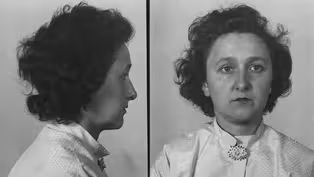
How hormone therapy for menopause got a bad reputation
Clip: 1/18/2025 | 7m 27sVideo has Closed Captions
How a decades-old study gave hormone therapy for menopause a bad reputation
Menopause is a chapter in women’s lives that brings a myriad of sometimes debilitating medical issues that can last for more than a decade. It’s an area of medicine that for years has been overlooked and underfunded. Rhode Island PBS Weekly’s Isabella Jibilian reports for our ongoing series, “Unequal Treatment.”
Problems playing video? | Closed Captioning Feedback
Problems playing video? | Closed Captioning Feedback
Major corporate funding for the PBS News Hour is provided by BDO, BNSF, Consumer Cellular, American Cruise Lines, and Raymond James. Funding for the PBS NewsHour Weekend is provided by...

How hormone therapy for menopause got a bad reputation
Clip: 1/18/2025 | 7m 27sVideo has Closed Captions
Menopause is a chapter in women’s lives that brings a myriad of sometimes debilitating medical issues that can last for more than a decade. It’s an area of medicine that for years has been overlooked and underfunded. Rhode Island PBS Weekly’s Isabella Jibilian reports for our ongoing series, “Unequal Treatment.”
Problems playing video? | Closed Captioning Feedback
How to Watch PBS News Hour
PBS News Hour is available to stream on pbs.org and the free PBS App, available on iPhone, Apple TV, Android TV, Android smartphones, Amazon Fire TV, Amazon Fire Tablet, Roku, Samsung Smart TV, and Vizio.
Providing Support for PBS.org
Learn Moreabout PBS online sponsorshipJOHN YANG: Menopause is a chapter in women's lives that brings a myriad of what can be debilitating medical issues that can last for more than a decade.
It's an area of medicine that for years has been overlooked and underfunded.
Isabella Jibilian of Rhode Island PBS Weekly has our story we which is part of our ongoing series Unequal Treatment.
TANYA GLOVER, Artist: It was rage for no reason.
The only one I wasn't mad at was the dog.
ISABELLA JIBILIAN (voice-over): Artist Tanya Glover was 45 years old when she started noticing symptoms that she couldn't explain.
TANYA GLOVER: The anxiety big time.
That was the worst one.
The night sweats, the irregular periods, the heavy periods.
I just felt like I was kind of losing it a little bit.
And a friend of mine said something about perimenopause.
I'm like, what is that?
ISABELLA JIBILIAN (voice-over): It's a familiar story for Dr. Mary Jane Mincken, a gynecologist with Yale School of Medicine.
DR. MARY JANE MINKIN, Gynecologist: Menopausal symptoms Perimenopausal symptoms can be extraordinarily disruptive to women.
ISABELLA JIBILIAN (voice-over): Those symptoms can include increased anxiety, hot flashes, migraines, insomnia, vaginal dryness and changes in sexual desire.
And Dr. Minkin says all too often they aren't taken seriously.
MARY JANE MINKIN: I just feel horrible for so many of these women who come in and they've been miserable for so long for no good reason.
We have some great therapies for them so that people can lead totally normal lives.
ISABELLA JIBILIAN (voice-over): But those therapies are going underused because the traditional treatment, hormone replacement therapy, developed a bad reputation in 2002.
That's when Dr. Minkin says a prominent study called the Women's Health Initiative, or WHI, changed everything.
MARY JANE MINKIN: I remember where I was when JFK was shot.
I remember where I was at 9/11.
And I remember where I was on July 9, 2002.
ISABELLA JIBILIAN (voice-over): The study raised troubling questions about hormone therapies, including estrogen, which had been used as an effective menopause treatment since the 1940s.
For the study, researchers divided about 27,000 women into two groups.
Women who had hysterectomies were given estrogen or a placebo.
Women who still had their uteruses were given estrogen and a synthetic version of the hormone progesterone, or a placebo.
DR. RENEE EGER, Women and Infants Hospital in Rhode Island: It was supposed to go on for over 10 years.
ISABELLA JIBILIAN (voice-over): Dr. Renee Eger is the director of the menopause program at Women and Infants Hospital in Rhode Island.
She explained a worrisome finding that stopped the study dead in its tracks.
RENEE EGER: After five years, there was noted to be a statistically increased risk of breast cancer in the women who took the estrogen plus the synthetic progesterone.
That study made it onto the front page of the New York Times.
It was the topic of talk shows.
The number of prescriptions for hormone replacement therapy decreased by 85 percent.
Those numbers have not rebounded.
ISABELLA JIBILIAN (voice-over): Today, instead of estrogen, Tanya Glover relies on anti-anxiety medication for her menopause related depression and anxiety.
TANYA GLOVER: It's taken the edge off.
That's it though.
It's still there.
I probably couldn't do a job, a regular job.
I don't think I could handle it and that's not an option for a lot of people.
ISABELLA JIBILIAN: Did you ever consider hormone therapy?
TANYA GLOVER: I considered it.
My doctor told me most insurances don't cover it and it's pretty expensive and you know, you hear about the cancer risks and I don't know who to believe.
ISABELLA JIBILIAN (voice-over): What to believe about the WHI study has been the question for the last 20 plus years.
RENEE EGER: The actual increased numbers of breast cancer was only eight women out of every 10,000 women.
So from a clinical standpoint, it was questionable whether that was actually significant.
ISABELLA JIBILIAN (voice-over): And the findings were skewed because the study included women in their 70s.
MARY JANE MINKIN: The average age of women enrolled in the WHO was 63.
The average age of women going through menopause is 51.
So you had these women who were way post menopause.
ISABELLA JIBILIAN (voice-over): It has taken decades for hormone therapy's reputation to rebound.
Last May, a study published in the Journal of the American Medical Association found that hormones were safe for many women under 60.
RENEE EGER: For women who are at low risk and appropriate candidates for hormone therapy.
Hormone therapy is very safe when you look at the risks versus the potential benefits associated with it.
We no longer tell women that they absolutely are or are not candidates for hormone therapy, but rather have individualized discussions with patients and take a look at their past medical history.
ISABELLA JIBILIAN (voice-over): But Dr. Minkin says many doctors are not prepared to give this kind of guidance after being trained under the flawed findings of the WHI study because women.
MARY JANE MINKIN: Stopped using estrogen in droves.
Most programs training residents and OBGYN and some other specialties basically stopped teaching how to manage menopause.
ISABELLA JIBILIAN: So they didn't think they had any good treatment options and therefore they stopped teaching about menopause altogether.
MARY JANE MINKIN: Exactly.
Even as of last year, 70 percent of the OBGYN programs in the United States were not teaching menopause management.
ISABELLA JIBILIAN (voice-over): Even with new safer treatments, two decades after the WHI study, many patients don't believe their symptoms can be treated safely, but there are signs that change is happening.
OPRAH WINFEY: Why is such a critical part of women's health being ignored?
ISABELLA JIBILIAN (voice-over): It's getting increased attention on social media.
WOMAN: Good morning, Miniverse.
Okay.
WOMAN: Do your periods just stop when you enter menopause?
ISABELLA JIBILIAN (voice-over): And in the highest levels of government.
Last March, President Biden signed an executive order to expand women's health research, noting menopause as a particular area of interest.
WOMAN: This is a hot flash.
ISABELLA JIBILIAN (voice-over): Now a non-hormonal drug is available.
It was even advertised during last year's Super Bowl.
As for Tanya Glover, it's been a long, turbulent phase of life.
ISABELLA JIBILIAN: How many years has it been now?
TANYA GLOVER: At least 10.
ISABELLA JIBILIAN: Of perimenopause.
TANYA GLOVER: I haven't had a period since last March.
So I'm like a week or two away from full blown menopause.
ISABELLA JIBILIAN: How does that feel?
TANYA GLOVER: I don't want to jinx it, but it feels like relief is right around the corner.
I need that.
ISABELLA JIBILIAN (voice-over): For PBS News Weekend, I'm Isabella Jabilian in Providence, Rhode Island.
Israel announces last-minute snag in hostage deal with Hamas
Video has Closed Captions
Clip: 1/18/2025 | 4m 16s | Why Netanyahu announced a last-minute snag in Israel-Hamas ceasefire and hostage deal (4m 16s)
Why Ethel Rosenberg’s family is pushing for her exoneration
Video has Closed Captions
Clip: 1/18/2025 | 7m 48s | Ethel Rosenberg’s family pushes Biden to exonerate her decades after her execution (7m 48s)
Providing Support for PBS.org
Learn Moreabout PBS online sponsorship
- News and Public Affairs

FRONTLINE is investigative journalism that questions, explains and changes our world.

- News and Public Affairs

Amanpour and Company features conversations with leaders and decision makers.












Support for PBS provided by:
Major corporate funding for the PBS News Hour is provided by BDO, BNSF, Consumer Cellular, American Cruise Lines, and Raymond James. Funding for the PBS NewsHour Weekend is provided by...

